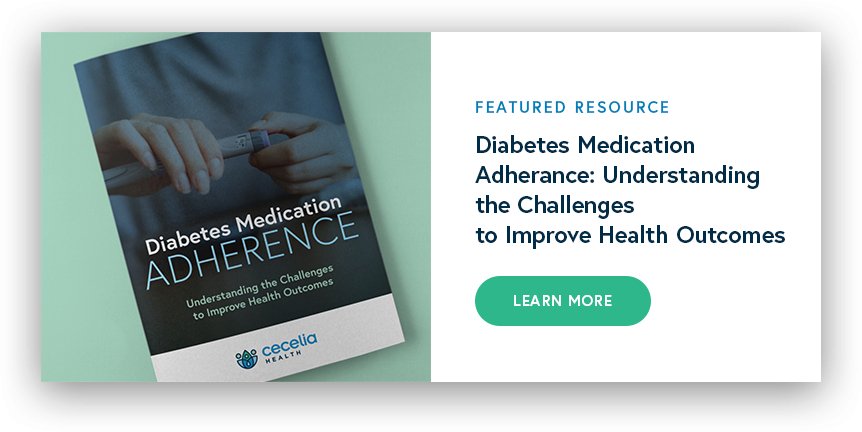Of the many unique barriers to medication adherence faced by those living with diabetes, fear may be one of the most difficult to overcome. Fear is not a behavior that can be changed with coaching; it is often deep-rooted and personal.
According to the American Association of Diabetes Educators, poor medication adherence results in up to 69% of medication-related hospital admissions in the U.S. and at least 125,000 deaths per year.
Overcoming fear barriers is an important step to self-management for diabetes patients. Once an individual learns and implements the right coping mechanisms that work for their unique needs, they become empowered to perform the self-management activities that otherwise would be daunting.
Before we explore strategies for improving adherence and persistence, here are four of the most common fears that can contribute to patients not taking medication as prescribed.
Common Fears Contributing to Diabetes Medication Nonadherence
Fear of Needles/Injections
Whether used for self-monitoring or administering medication, fear of needles is extremely common. In fact, it is estimated that at least 10% of American adults have a fear of needles, and it is likely that the actual number is larger.
Fear of Lifestyle Change
Many people who are newly diagnosed with diabetes see “giving in” to treatment as a sign of defeat. They may be in denial about their diagnosis and feel overwhelmed at the prospect of making significant lifestyle changes, which can include self-monitoring and adhering to prescribed medication regimens.
Fear of Side Effects
If an individual has heard about, read about, or experienced negative side effects from a diabetes medication, he or she may be afraid that continuing treatment will have adverse effects. There may be a fear that continuing to take the medication will result in poor mental and/or physical quality of life. Fear of hypoglycemia and weight gain are also common.
Fear of Social Judgement
Some people may avoid taking their diabetes medication for fear of being judged or stigmatized by society, and even by those closest to them. One study found that most participants with type 2 diabetes felt blamed by others for causing their condition, subjected to negative stereotyping, or discriminated against in some other way.
Strategies for Helping Patients Overcome the Fear Barrier
Clearly, fear is a deep and complex emotion that can have negative consequences when it causes patients to avoid taking diabetes medication. Fear is not based in logic, so often the standard education about why the medication is important are not enough to get the patient to make changes.
At Cecelia Health, we have found that the best, most clinically effective way to see measurable improvements in diabetes medication adherence is through the support of a Certified Diabetes Educator (CDE). CDEs are health professionals who work one-on-one with patients to help identify their personal barriers and teach strategies for overcoming them. CDEs educate and support people affected by diabetes, as well as promote self management to achieve individualized behavior and treatment goals.
Here are four examples of strategies CDEs employ when helping patients work through their fear barriers to achieve measurably improved health outcomes.
Convey empathy
One reason support from a CDE is so effective is because CDEs truly care about their patients as people. They get to know each individual—not just their medical history, but who they are. CDEs empathize with patients and show genuine understanding for their struggles. By doing so, they build trust, and patients become more likely to follow the CDEs’ advice.
Avoid judgmental language
For many caregivers and family members of people living with diabetes, it’s all too easy to fall into a pattern of judgmental statements. CDEs are experienced in using non-judgmental conversations to continue the trust-building with their patients.
Use motivational interviewing techniques
Motivational interviewing helps people identify their feelings and insecurities and find the motivation they need to change their behavior. CDEs are skilled in asking the right open-ended questions to encourage discussion; for example, “Have you heard or read anything lately that concerns you about your medications?”
Arrive at solutions through brainstorming
While helping patients identify their fears, CDEs also help them brainstorm solutions and coping mechanisms to overcome those fears. For example, if an individual with diabetes is afraid of negative side effects from their medication, the CDE may help them create a plan for minimizing and coping with those side effects. Or, if the person has a fear of needles, the CDE could share steps for calming him or herself before injecting or help the person practice alternate site testing.
Achieving positive health outcomes requires more than education; it requires deep behavioral and mindset changes. But as we have seen, making these changes is challenging for a wide variety of reasons. Only through the caring experience of human connection can many people begin to self-manage their conditions.
At Cecelia Health, our personalized, technology-enabled, scalable approach has been proven to increase medication adherence in diabetes patients. How can Cecelia Health’s proven approach help your organization achieve the results you need?

